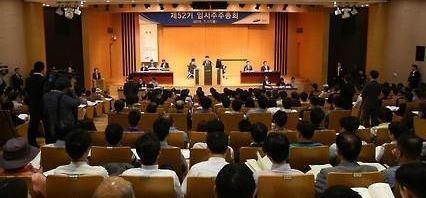A debate is brewing in South Korea over the idea of introducing a dual-class stock structure, with proponents supporting it for the sake of startups and innovative businesses, while critics worry that such a system would invite abuse by conglomerates.
In a dual-class stock structure, a single company can issue different classes of shares -- for instance, class A shares could be reserved for founders and executives and carry more voting power while class B shareholders could have limited voting rights.
A dual-class stock system was first adopted in the US in 1994 to protect the rights of management in the face of rampant hostile mergers and acquisitions, which had been commonplace since the late 1980s. Now, US tech firms such as Snapchat, Google and Facebook issue dual-class shares.
In Korea, which still clings to a “one share, one vote” system, debate is taking place among lawmakers, academics and entrepreneurs about whether the nation should permit dual-class stock structures like other nations such as the US, the UK, France, Singapore and Hong Kong.
“It is time for us to have in-depth talks about the adoption of the dual-class stock as there is, certainly, a demand for the system among both large and small companies in Korea,” said Kang Seog-gu, director of corporate policy with the Korea Chamber of Commerce and Industry, the largest business federation in Korea, during a Wednesday symposium hosted by CFA Society Korea.
Kang said large companies want to adopt the system to protect management rights from institutional investors, which are increasingly adopting stewardship codes requiring investors to participate actively in corporate governance by exercising their voting rights in the interests of their beneficiaries.
At small firms, controlling shareholders tend to be the founders’ heirs. They want more voting power due to inheritance taxes, which can be as high as 65 percent, making it difficult to protect their management rights.
At startups, voting rights are especially important to the founders because they can receive investment from large companies without having to worry about losing their power to make business decisions.
“I believe dual-class stock will help many startups like mine to build long-term strategic plans without interference from investment funds,” said Park Soo-hong, a chartered financial analyst and CEO of the local startup Qubiz Korea.
“When there is strong engagement from investment funds, the original goals set by the management can sometimes be diluted. I saw many businesses fail for that reason,” he said.
In August, Rep. Choi Woon-yeol of the ruling Democratic Party of Korea proposed a bill that would enable one share to carry up to 10 times the voting rights of an ordinary share -- but the issuance of those dual-class shares would be limited to startups. The lawmakers intend to push for the bill and are still in discussions with the Fair Trade Commission and the Ministry of Justice.
The adoption of a dual-class stock system still faces challenges from liberal lawmakers, civic groups and academics, who say it could ultimately be misused to ensure management succession at conglomerates.
“Why do we need to give more power to the controlling shareholders?” asked Shin Jhin-young, a professor of finance at Yonsei University’s school of business.
“Look at most large companies here. Even though they have clear guidelines for voting rights, almost no institutional investors are able to actually exercise them.”
For the size of its economy, Korea is still weak in terms of market accountability and transparency of corporate governance. It ranked ninth out of 12 key Asia-Pacific economies in terms of corporate governance, according to a report published by the Asia Corporate Governance Association in December.
“When activist funds exercise their voting rights, it can positively affect companies’ performance and share prices. Also, when startups have dual-class stocks, this may make venture capitalists hesitate to invest in the firms,” Shin said.
 |
(Yonhap) |
Lee Won-il, a founder of Zebra Investment Management, said, “For a nation with a relatively short history of capitalism, (Korea) needs to be more prudent instead of blindly following Western nations.
“Look at Hong Kong. As many of you know, the Hong Kong Stock Exchange adopted the dual-class stock system for Xiaomi’s listing. Now what? The firm’s share price has dropped by 40 percent since then.”
In July, Xiaomi became the first company to launch an initial public offering on the Hong Kong exchange with dual-class shares. The founders received dual-class stocks to better enjoy their management rights. Since that time the business has been struggling in the smartphone segment, and individual shareholders have suffered.
Jin Ick, director of the economic analysis coordination division within the National Assembly Budget Office, said there was a need for more discussion to better understand the advantages and disadvantages of the system.
“As a policymaker, I believe either side -- whether to adopt (the new system) or not -- has pros and cons. But, there is no solid ground to understand the advantages and disadvantages. When such ground is established, I believe a social consensus will be formed faster.”
By Shin Ji-hye (
shinjh@heraldcorp.com)








